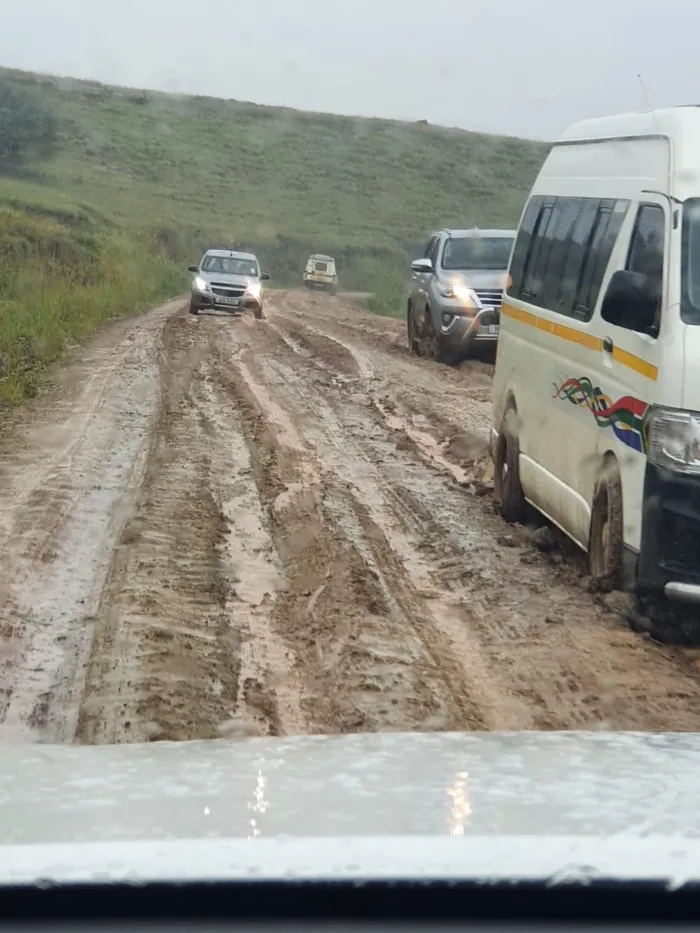
The Loteni Road in the Himeville small village/town situated in the foothills of the Southern Drakensberg of the KwaZulu-Natal province. . Picture: Supplied by Kwanalu
Image: Supplied by Kwanalu
The upcoming National Budget must also directly address the structural neglect of rural communities and formally incorporate traditional leadership into South Africa’s long-term development planning.
This was said by Kgosi Nyalala Pilane, leader of the Bakgatla Ba Kgafela tribe ahead of the third budget to be presented by Finance Minister Enoch Godongwana next week.
Kgosi Pilane said it was vital that the national budget goes beyond macroeconomic targets to focus on foundational infrastructure that enables local economies to grow.
“Government must understand that infrastructure is the cornerstone of economic development. No investor will consider establishing operations in a community without roads, electricity or water. The continued failure to address these basic needs perpetuates poverty and undermines national growth.”
According to the traditional institution’s website, the Bakgatla-ba-Kgafela tribe resides in the North West Province under the jurisdiction of the Moses Kotane Local Municipality in the vicinity of Sun City.
Its tribal capital is the village of Moruleng, some three kilometres from Bakgatla Gate on the edge of the Pilanesberg National Park.
It is said to comprise 32 villages spread across an area of 160 000 hectares in the Bojanala District and Moses Kotane Local Municipality.
In Vote 42 on Land Reform and Rural Development published by the National Treasury recently, the document said the purpose of this vote was to provide equitable access to land, integrated rural development, sustainable agriculture and food security for all.
It added that the mandate of the Department of Land Reform and Rural Development is to facilitate equitable access to land, promote comprehensive rural development and address the historical injustices of land dispossession by implementing land restitution programmes and supporting sustainable livelihoods across rural areas.
The Vote said the Rural Development Programme’s purpose is to facilitate rural development strategies for socioeconomic growth. It added that it must also promote an integrated and inclusive rural economy through the coordination and implementation of rural development strategies over the medium term.
Subprogrammes include include the National Rural Youth Service Corps provides social organisation, youth development and economic upliftment in rural areas.
Another one is the Rural Infrastructure Development facilitates infrastructure development in rural areas, and the Technology Research and Development develops and adapts innovative and appropriate technologies in rural areas.
The vote said Rural Development Coordination facilitates, coordinates and supports the planning, implementation, monitoring and reporting on rural development initiatives and programmes implemented by departments in all spheres of government, in line with the integrated rural development sector strategy and comprehensive rural development programme, to ensure access to socioeconomic development services.
Pilane said cutting waste and curbing corruption should take precedence over introducing additional taxes that further burden citizens.
“It is not always a question of insufficient funds, but rather how those funds are managed. Fiscal discipline, transparency, and accountability must become non-negotiable in every department.”
He also raised concerns over the size of government and inefficiencies in public spending.
“We cannot continue to justify the cost of an inflated executive. Almost every minister is supported by one or two deputy ministers, yet rural areas remain without roads, schools or clinics. The financial resources consumed by these positions could be far better spent on direct service delivery where it is most needed.”
With the country facing a significant budget deficit, Pilane urged the Finance Minister Enoch Godongwana to prioritise spending that delivers real impact and avoid shortcuts that harm low-income households.
“A VAT increase or fuel levy adjustment may appear expedient, but the cost will be borne most heavily by the poor. That is not the kind of recovery South Africa needs.”
“The path forward requires input from all sectors of society. It is time for the government to listen and act accordingly,” he said and added that a year later, the Government of National Unity has yet to deliver a positive impact where it matters most: alleviation of poverty.
“Unemployment remains high, infrastructure is still lacking, and service delivery continues to bypass the very people most in need. From where we stand, no difference has been felt.”
The traditional leader also called for the formal recognition of traditional leadership as a key partner in development.
“We represent millions of South Africans living in rural areas. Our institutions are well-placed to support government efforts, but we must be included. This budget must reflect not only financial strategy, but a moral commitment to equity, inclusion and lasting development,” Pilane said.
Independent Media Property
Related Topics: